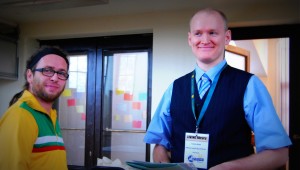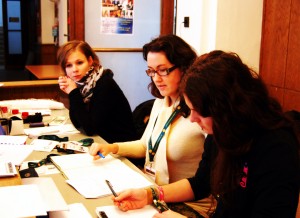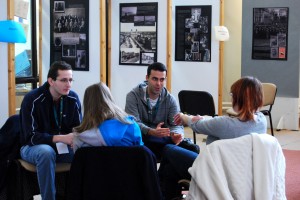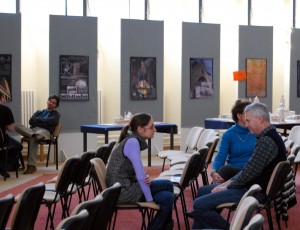Borrowing and having quality conversations with living books? Even though it sounds quite unrealistic this was exactly what AEGEE-Debrecen put into practice – presumably for the very first time ever – at the University of Debrecen.

A short history of Human Libraries
Having been invented for its visitors and also organised for the first time at the famous Danish Roskilde Festival in 2000, the “Human Libraries” (also called “Living Libraries”) have always aimed at helping to build social cohesion and a greater understanding for diversity in the community, locally as well as on a global level.
The “Human Library” Project has also been a part of the Council of Europe‘s youth sector’s priority program “Youth Promoting Human Rights and Social Cohesion” from 2003-2005. Human Libraries are similar to usual ones only in terms of the feature of the borrowing procedure. Visitors are entitled to borrow books for a 40-minute one-on-one talk. The major difference is that these books are alive, they are actual persons thus they can be asked to provide answers on specific questions but the “books” can also ask their “readers” thus they can also “read” the visitors a bit.

Human Libraries intend to point out that human rights cannot be protected solely by legal documents. It is the responsibility of each citizen of a certain country to protect them for the sake of the common good.
AEGEE-Debrecen takes action
Since a Human Library has been organised for several times in Budapest, AEGEE-Debrecen decided to bring it to their city. December10th was chosen as the date as it is the International Day of Human Rights.
Prior to the event the antenna approached numerous individuals belonging to certain groups that are frequently treated in a discriminatory manner by the mainstream society or they have to cope with difficulties in daily life. Since discrimination is often present due to widespread stereotypes that are the direct results of the lack of knowledge about these groups of people, personal interactions deriving from genuine curiosity can contribute to a better understanding of each other on both sides. This is what the Human Library concept is based on.

Our “living books” were mostly highly-skilled professionals and/or talented citizens with outstanding communication and people skills in order to be able to provide visitors with a quality time/content during the conversations. Our visitors in Debrecen were finally given the unique chance of being able to freely talk to representatives of groups such as abstinent alcoholic, former drug addict, physically disabled, overweight, male nanny, policeman, social worker, youth/NGO volunteer, student of philosophy and mathematics, clergyman, religious, visually impaired and blind persons.
A great tool for fostering integration
It has been quite striking to discover the obvious fact how the lack of these kind of platforms for communicating with each other can lead to several misinterpretations about each other and ultimately to acquiring/accepting stereotypes while in reality we are similar considering our motivations.

Having been provided with an event venue in the University Church by the Debrecen Reformed University Congregation and being described as a great initiative by the chief psychologist of the University Centre for Mental Health and Equal Opportunity also confirmed us that we would like to return with a larger-scale event soon.
In order to be able to strengthen respecting human rights, citizens need to be reminded of the importance of mutual respect, patience, empathy, understanding and tolerance. Attending these events can contribute to supporting the desired aim to a great extent.
Here you can find a video (in Hungarian) about the event and here you can find a photo album of the event.
Written by Balázs Kovács, AEGEE-Debrecen

